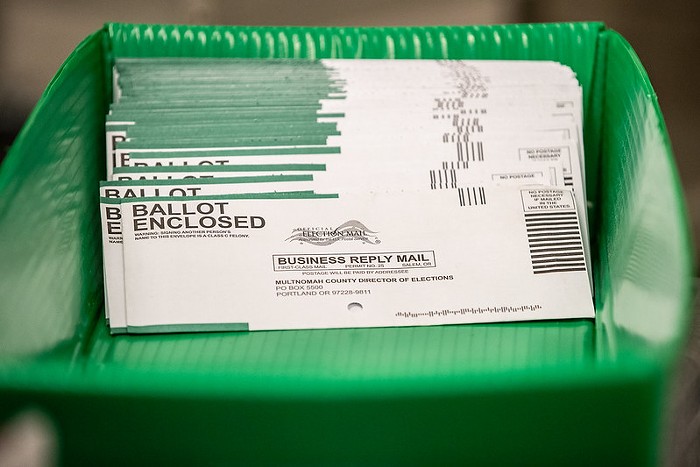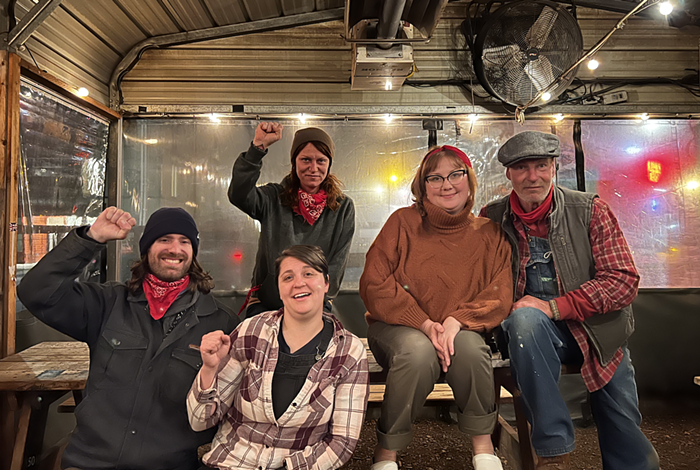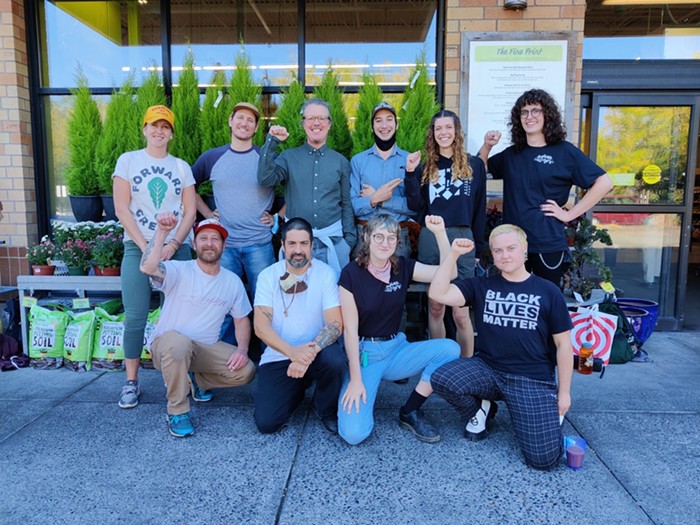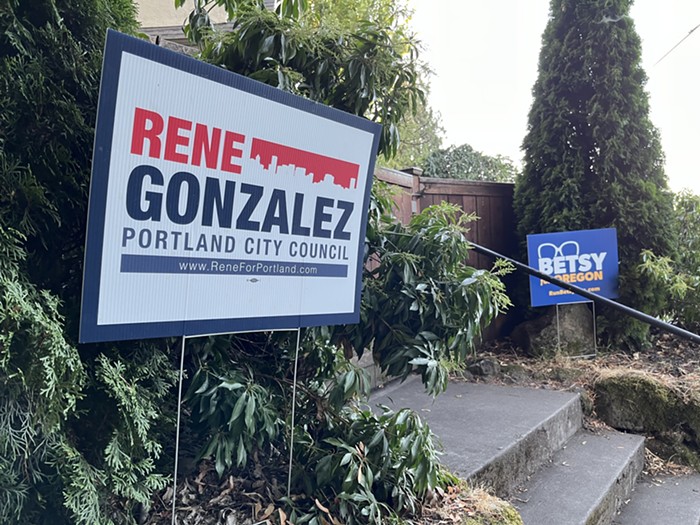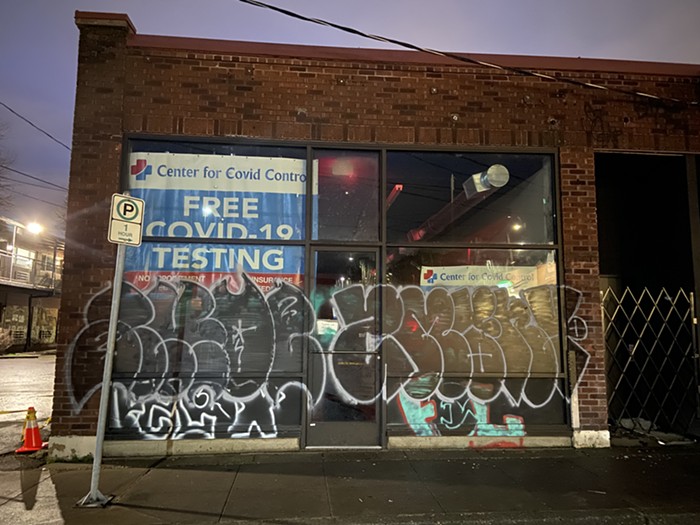
State and county public health agencies have minimal to no oversight of COVID-19 testing facilities run by private companies, the Mercury has found.
As demand for COVID testing in Oregon far outpaces supply, testing services offered by Multnomah County and its community partner organizations, the Oregon Health & Science University, and large pharmacies like Walgreens and CVS are filling up quickly.
At the same time, at-home COVID rapid tests seem to disappear from pharmacy shelves almost as soon as they arrive. This has left Portlanders turning to pop-up testing clinics run by private companies for their testing needs. While these testing sites require a federal certificate to operate, any further oversight of the testing sites is driven through a community complaint-prompted process.
This week, the Oregon Department of Justice (DOJ) launched a civil investigation into the Center for Covid Control—a national company claiming to offer rapid antigen and PCR tests at over 300 sites across 29 states, including three testing sites in the Portland metro region. All three testing sites are listed as temporarily closed on Google as of Thursday morning. The investigation was first reported by Willamette Week.
The DOJ is basing its investigation on two complaints filed in October 2021 from Portlanders who were concerned about the validity of the Center for Covid Control’s testing sites. The complaints detail one person's experience taking a rapid test that was past its expiration date and another person who never received their test results.
Oregon DOJ spokesperson Kristina Edmunson confirmed the investigation launched this week, but did not answer the Mercury’s questions about why it took four months for the state to launch a civil investigation.
In a Wednesday press release, Attorney General Ellen Rosenblum warned the public of “testing sites that seem suspicious,” but did not mention her office’s investigation.
“We are keeping a vigilant eye on the marketplace and working with OHA to ensure testing sites are in compliance with state laws,” Rosenblum said.
Notably, USA Today published an investigation this week highlighting issues people in several states have had with the Center for Covid Control. WINK News, a broadcast news organization in Florida, also published an investigation into Center for Covid Control test sites earlier this week after a Florida family was emailed their supposed negative test results from the company’s testing site while they were still in line waiting to be tested.
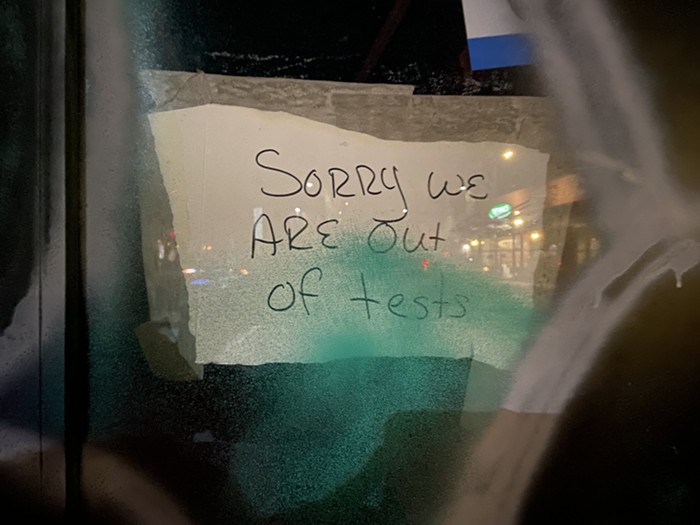
According to both county and state public health, neither the state nor county have explicitly partnered with the Center for Covid Control. That means the company’s testing sites have not received funding from the county or state and have not been explicitly endorsed by regional public health agencies.
Oregon Health Authority (OHA) spokesperson Rudy Owens told the Mercury that all testing sites must obtain a Clinical Laboratory Improvement Amendments (CLIA) certificate from the US Department of Health and Human Services and report all test results to the OHA to be in compliance with state rules.
The Center for Covid Control has a CLIA certificate ID number—the number is listed on each test patient’s results page from the company. The company has not, however, shared any test results with OHA, according to Owens. The Center for Covid Control has been operating in Multnomah County since at least October 2021.
Owens said the OHA has referred this issue to the Centers for Medicare & Medicaid Services (CMS), a federal agency responsible for enforcing CLIA licenses.
“Throughout the pandemic, and especially during the Delta and now Omicron surges, OHA has needed to prioritize its actions, and because of capacity constraints, it has not been able to monitor all testing sites within Oregon,” Owens said. “As we become aware of complaints or noncompliant sites, we work with DOJ and CMS to investigate and take proper action.”
Owens also said that the majority of testing in Oregon occurs through the healthcare system, not auxiliary pop-up sites like Center for Covid Control. Because of that, Owens said, “there have been very few concerns about testing facilities.”
While the county and state may not have explicitly partnered with the company, people who call the Multnomah County COVID resource hotline were being directed to the Center for Covid Control's local testing sites.
“The Multnomah County COVID call center does its best to connect people seeking testing to known, trusted testing locations,” said Multnomah County spokesperson Kate Yeiser. “The surge in the past few weeks means the demand for testing has far outpaced local capacity, especially for people without health insurance who need free testing. In these instances, the call center essentially serves as a resource to help the individual find their next best option, whether through private testing or help finding an at-home test.”
According to Yeiser, call center operators identify these next best options and “don't necessarily indicate an endorsement or suggestion” to the caller. The county will stop referring callers to a testing resource if it is notified by the OHA that the testing site is operating outside of state rules.
As of Wednesday morning, Multnomah County had not received a notification from OHA that the Center for Covid Control testing locations should be pulled from the resource list. However, the county independently decided to pull all three of the Center for Covid Control’s testing sites from its resource list Tuesday morning after the Oregon DOJ investigation was launched.
Portlanders who have recently been tested at Center for Covid Control locations haven’t reported any concerning practices.
Portlander Marc Meadows needed to get a test on Sunday, January 9, after a family member he was in contact with a week prior tested positive for COVID. Meadows, an OHSU employee, normally receives COVID tests at work, but OHSU does not offer employee tests on the weekends.
After struggling to find open testing sites on Multnomah County’s website, Meadows called the Multnomah County COVID-19 hotline. The call center operator directed Meadows to a Center for Covid Control location near Johnson Creek.
Meadows told the Mercury that at the walk-up site he was given a piece of paper with a QR code that, when scanned, took him to a page where he filled out his name, email, and uploaded pictures of his drivers license and insurance card—all information that’s also collected by larger pharmacy testing sites like Walgreens. Meadows self administered a nasal swab, placed the sample in the provided bottle of saline solution, and dropped the sealed bottle in a large collection bucket. Five hours later, Meadows was emailed a negative test result.
For Naomi—a Portland resident who asked to only be identified by her first name for privacy—going to the Center for Covid Control’s site in the Hollywood neighborhood on December 23 was her first COVID testing experience. Naomi found the site by Googling “COVID test near me,” a search process recommended by the Biden administration.
When she arrived, Naomi was also provided a paper with a QR code leading to the sign up page and then given a box of rapid antigen tests—similar to the at-home kits sold in stores—by a site employee wearing disposable scrubs. Naomi went back to her car to take the test and wait for her results to appear on the rapid test stick, but was told by the employee that it was important for her to fill out her name, date of birth, and her test result on the provided piece of paper. According to that employee, the Center for Covid Control would not be reimbursed for the rapid home tests if they did not report the results of the distributed tests.
“They were really clear that it was very important that we bring the test back,” Naomi said. “She said, ‘We don't get paid for the test if you don't bring them back.’”
When contacted by the Mercury by phone, a Center for Covid Control employee said all questions must be directed to the company’s press email and declined to answer questions over the phone. The company has not responded to the Mercury’s emailed questions about how they fund their testing operations.
According to Willamette Week, OHA has not provided any funding to the Center for Covid Control. The US Health and Human Services department did not immediately respond to the Mercury’s questions on whether they have reimbursed the company for COVID tests.
When asked if OHA has any advice on how Oregonians can find reputable COVID testing sites, Owens said anyone who thinks they have been involved in a scam should report their experience to the Oregon DOJ, but did not provide any advice on how to preventatively identify red flags at testing sites.
OHA’s testing locator does not currently list any of the Center for Covid Control’s testing locations.
Because her experience at a Center for Covid Control site in December was her first time taking a COVID test, Naomi wasn’t sure whether her experience was normal or not.
“Maybe a couple things seemed odd, but this whole COVID situation is odd,” Naomi said. “I mean, I did a Curative [another private company offering free tests] test last week in the field at Revolution Hall. I don’t know what’s normal.”

